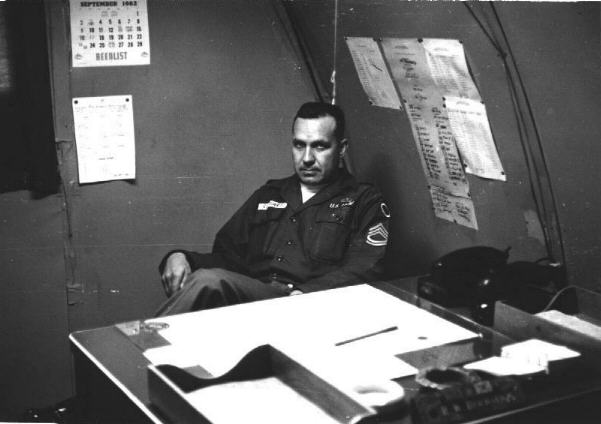

Camp St Barbara was located approx 30 road miles north of Uijongbu, South Korea, above the 38th parallel. It was the headquarters for I Corps artillery and was named after the patron saint of artillery men. Uijongbu was the headquarters of I Corps and its mission was to see that the North Koreans stayed home. The artillery units formed a barrier along this invasion route to the South Korean capitol of Seoul. South of the camp was Camp Casey where the I Corps armor was positioned to move as needed to stem any enemy action.
The 55th Military Police was assigned to I Corps to provide police services. The MP Company provided for police services to the north with a unit called detachment #1, which was located at St Barbara. This unit was unofficially called, "The law north of the 38th parallel". The detachment was composed of 25 US Army MP's and 25 South Korean MP's when at full strength. The 55th MP Co assigned me to the detachment, after my arrival in Korea, on 15 Feb 1962. Due to a shortage of MP officers I was made the detachment commander. An artillery officer was appointed to sign any paperwork, which required an officer's signature. The officer happened to be one who I had at jump school, in Germany, with the 11th Airborne in 1956, but he was now a captain.

There was a criminal investigation (CI) unit located in the police station. I had been trained as an investigator and these guys were on holiday. They spent most of their time pilfering steaks from, rear area units, for their frequent barbecues. They also provided "ladies" for the general's nighttime pleasure. Work, they did not. I became a thorn in their side when they fluffed off their duties on the MP detachment. It had worked in the past, but I was in charge now and I demanded they accept their responsibilities. The general was returned to the states early. I don't know how it was handled officially, but his conduct was the reason. The warrant officer of the unit moved on and the CI unit became effective again.
There was a quarter of a quonset hut in the area and I made it into my living quarters. When I was finished it had a fireplace, bar, cooking utensils, stateside bed, refrigerator, and telephone. The hut was my sanctuary from the constant stress.
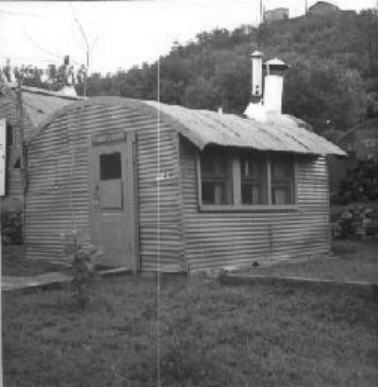
I lacked non-commissioned officers to help me, but they weren't available and as a result the burden fell on me. One day I received a call that they were sending me a corporal, but there was a pause and I questioned that pause and found out I was receiving an alcoholic.
Cpl Jones arrived and it was apparent that they had been right. I utilized him as best I could. He got deeper and deeper into the booze. I persuaded him to seek medical help and contacted our doctor (a friend of mine). Jones was put in the camp hospital for a 10 day dry out session. I talked to the doctor about the fourth day and he said he was doing great. The doctor got mad at me when I said he must have gotten a hold of some alcohol, because I knew he would have to go thru a real down side first. He left the hospital on the 10th day and came to my quarters to ask me to use my phone. He called the PX and asked them to deliver a case of beer to his quarters. I knew then and there that I had been right and the doctor wrong. Jones was finally transferred out and died while with the other unit.
I had the usual personnel problems and they were worked out with one exception. Booze was the culprit again. I tried and tried to get the man back in line, but failed for the first time in my career. I sent a letter to my company headquarters in which I outlined the man's problems and that I had to admit failure for the first time in my career. The soldier was transferred to the infantry and I never found out if he got back on track.
Just south of the camp was the small village of Twamdong. If the camp had not been there I don't think the village would have existed. It had its bar and about 25 prostitutes. The girls were checked weekly, by the medics, and at any check at least one quarter was found to have some kind of venereal disease. These were unofficially treated by the medics to halt the spread.
The mess hall was located about a mile away in a hollow and by the time you walked there and back you were ready for another meal. I talked them into a can of bacon and my ration of eggs and from that time on I prepared breakfast in my hut. Once a week we received a large tablet, in the mess hall, from the medics, which we signed for. It was a preventive tablet and was supposed to take care of three diseases. I don't know what it contained, but one of the local girls decided to take three at a time and she departed this world forever. After that I had my concerns about taking one.
We had national police detectives and interpreters assigned to the police station. All nice people, but the one detective could get a confession from a saint. He used a simple form of torture. He would make the suspect kneel and the he would place a broomstick in the void across the back of both knees. The suspect would then sit back on his heels and when slight pressure was put on his head, he would suffer great pain. I forbid them to do it in my police station and that hurt feelings. I was told that Kwan (the detective) had suspended a suspect from a railroad trestle and had fired at the guys fingers until he decided to talk. His pistol was an old beat-up .32 cal Colt automatic, the type which was issued to general officers.
We had trouble with "slicky Boys". These were Koreans who would infiltrate the camp day and night and steal everything in sight. Anything we threw away was put to use by the Koreans, as was anything we had. The signal corps would string wire for communication and behind them would come the slicky boys, stealing it almost as fast as it was put up. We even had trouble at our garbage dump. They would scoop it off the truck before it could be dumped. They would leave only after they had their pans and cans filled. I don't know if they ate it or took it to feed to their animals. Fifty-five gallon drums were in great demand. They would remove the top and bottom and then cut the drum from top to bottom and at that point the drum could be flattened into a large rectangle of metal. I know one of the uses was to form bodies for their busses. The Koreans apprehended a slicky boy and placed him in our holding cell and immediately backed away from him. I asked what the problem was and they said he had leprosy. I called the doctor and he examined him and said didn't have the disease. This slicky boy used the leprosy ruse every time he was picked up and so scared the police that they left him go, well it didn't work this time.
The artillery had their ranges north of the camp. The shells fell into an impact area. However, the area had to be cleared of metal scavengers before they could fire. This area also provided N. Korean infiltrators with a path south for spy missions. They would travel in threes (the spy and two escorts). The escorts carried 9mm Canadian automatic pistols. Why Canadian pistols? To throw suspicions away from North Korea. It is one of the intelligence community quirps. The spy knew the mission the other two were to escort him and return if possible. If it was apparent that the spy was to be captured they were to kill him, so his mission would remain secret. One day a Korean officer was briefing me about an intercept training mission he was running. I said that he would probably pick up a real spy in the process. Believe it or not that is what happened. The spy was dressed in the South Korean sergeant's uniform, complete with ID. He had plenty of US Military Payment Currency (used in place of dollars), but didn't know the money had been recalled several days before. These recalls were done from time to time and everyone knew when and had a very limited time to exchange the old money. The guy from N. Korea didn't know the exchange had taken place while he was headed south.
One day I had to travel to a small village to the west of our location. My driver and I took one of the jeeps and headed to the village. My driver called my attention to a man urinating in the river and to a fellow down stream a few yards washing his face. He said these people are nuts and I corrected him by informing him that the guy was smart, as the other guy was warming his wash water for him. We returned by the same narrow road and I had just settled down in my office when we received a call about a man who was killed by an explosion. It was a Korean who had discovered some metal in the road, which we had traveled. He dug at the metal (it was a vehicle mine) and it exploded. I realized how lucky we had been as we must have passed near it twice.
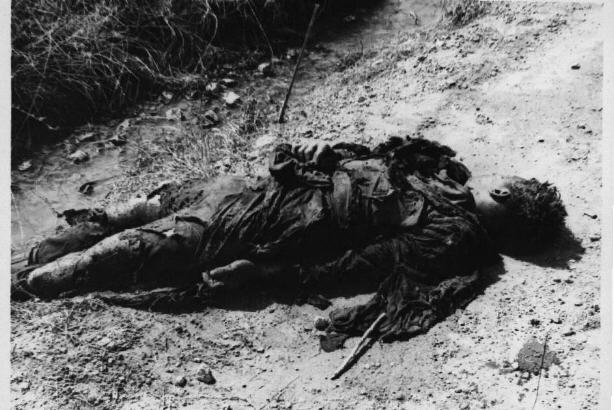

Everything was falling into place and the operation improved. I received new men and briefed them as to the many pitfalls, which included VD and hepatitis. Every once in a while you would try to reach a character who knew it all and fluffed off the talks. He was the guy who would show up with VD or on one occasion wind up in the hospital with hepatitis.
When inspections were scheduled we would knock them off with superior ratings and the morale was tops. I had learned in the airborne that you could request courtesy inspections prior to the real one. We would find our shortcomings and have them corrected before the inspections. There was no way to lose. That helped later when I became a first sergeant.
Lt Gen Harris arriving at Camp Saint Barbara on an inspection tour, October 1962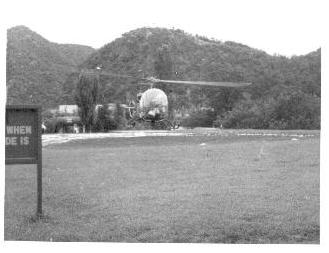
The day I received a long awaited promotion a whiskey salesman showed up from the states. That evening he gave out free whiskey at the club. A bottle per table. I couldn't believe the results. They did everything but take a bath in it. Add a mix to it---no way. There was some airborne in for training and it became a free for all. I found an airborne officer and he lined them up and marched them off. I put down my foot again. I told the club officers that there would never be any free whiskey again, they would have to reach in their pockets and spend some of their own money. Even if it was only a token price. And so it was.
There was an evening curfew when the troops had to be in camp. I had one guy who had his future wife in the village, so I looked the other way when he spent the night. I did the same for my clerk. His girl friend was the girl friend of a major. The major respected curfew and at that time my clerk would take over. We called it "back-dooring". I didn't go looking for them, but if they got in trouble after curfew they were on their own and as a result we had no trouble in that direction.
I did find time to go to the University of Maryland extension, which they had there. My goal was to obtain a two-year college level and I came within a couple credits of it and those I picked up at the next assignment.
I had been on the community relations board (the only enlisted man) and we had worked closely with the Pochon County representatives. As a thanks they took the acting Provost Marshal and me on a fishing trip in their national forest. They provided the bait (including girls) and the beer. We wound up in the county seat for a dinner. We were told that the door behind us was at our disposal and so were the girls. After the dinner the captain and I thanked them and disappointed them by leaving. Well, the captain and I were married and respected it as much. I did receive a letter of appreciation from the Pochon County officials and the Army did give me the Army Commendation for a job well done.
On 7 Feb 1963, I turned over my duty assignment and started for home and another assignment (which would turn out to be the Underground Pentagon).
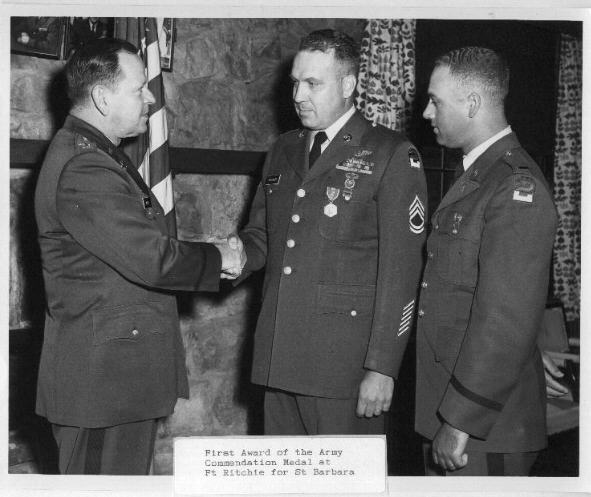
C-O-P-Y
H E A D Q U A R T E R S
I CORPS (GROUP)
C I T A T I O N
The Secretary of the Army has awarded the Army Commendation Medal to
SERGEANT FIRST CLASS ROBERT W REICHARD, RO13113730
for meritorious service:
As the Non-commissioned Officer-in-charge of the 55th Military Police Company Detachment at Camp Saint Barbara, I Corps (Group) Artillery, during the period 15 February 1962 to 7 February 1963. During his tenure of duty he supervised all Military Police operations within I Corps Artillery area. Sergeant Reichard displayed outstanding leadership ability, initiative and professional competence that resulted in his detachment receiving superior ratings in three major inspections. Although separated from his parent unit by a distance of thirty miles his strict adherence to the highest standards of military courtesy, discipline and conduct gained for him the upmost respect and confidence of superiors and subordinates alike. By his superior administrative and supervisory ability he molded the detachment into an effective military unit that enhanced the operational readiness of the command. Sergeant Reichard's exemplary performance of duty reflects great credit upon himself, this command and the Military Police Corps.
C-O-P-Y |
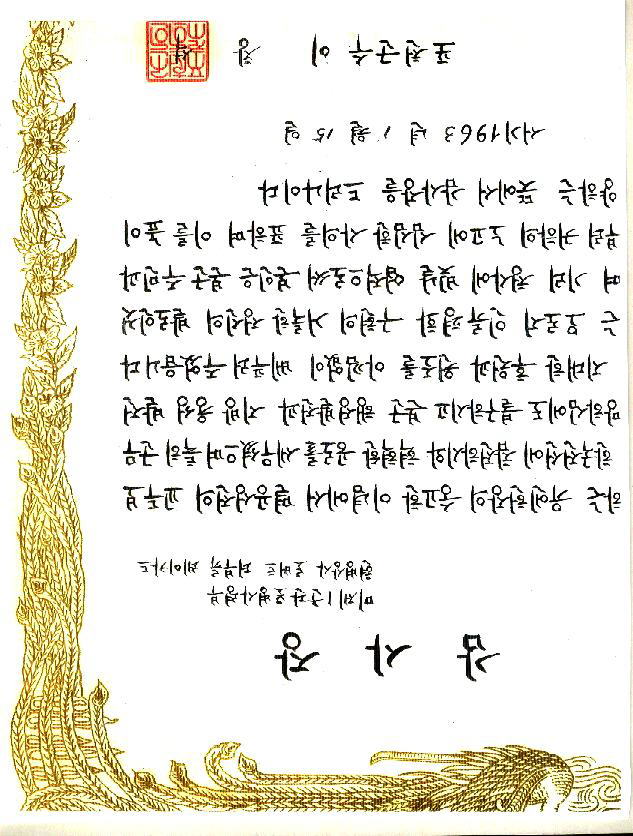
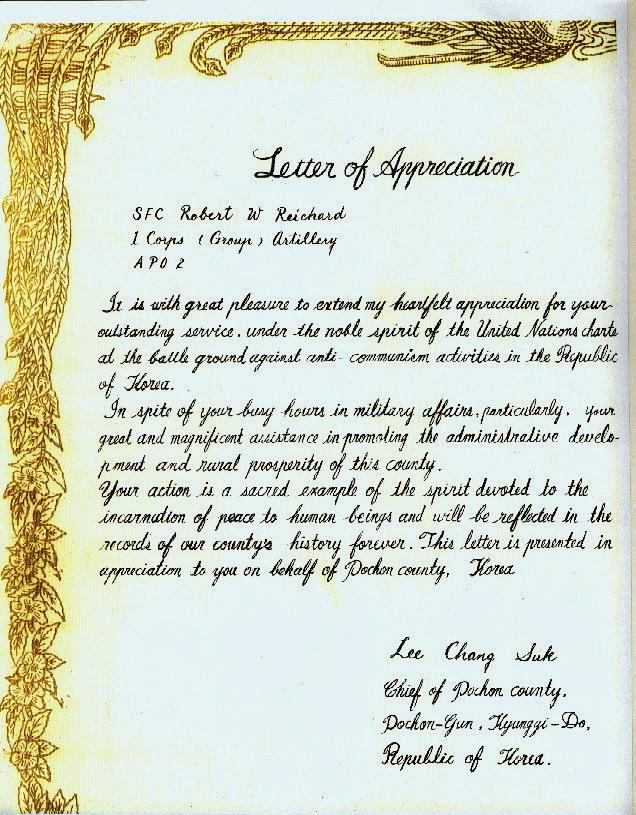
| Table of Contents | Previous Page | Next Page |